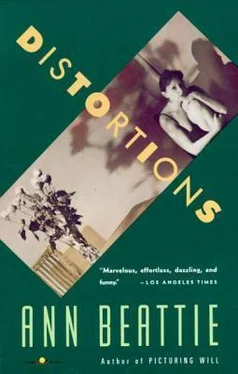Ann Beattie - Distortions
Здесь есть возможность читать онлайн «Ann Beattie - Distortions» весь текст электронной книги совершенно бесплатно (целиком полную версию без сокращений). В некоторых случаях можно слушать аудио, скачать через торрент в формате fb2 и присутствует краткое содержание. Год выпуска: 1991, Издательство: Vintage, Жанр: Современная проза, на английском языке. Описание произведения, (предисловие) а так же отзывы посетителей доступны на портале библиотеки ЛибКат.
- Название:Distortions
- Автор:
- Издательство:Vintage
- Жанр:
- Год:1991
- ISBN:нет данных
- Рейтинг книги:5 / 5. Голосов: 1
-
Избранное:Добавить в избранное
- Отзывы:
-
Ваша оценка:
- 100
- 1
- 2
- 3
- 4
- 5
Distortions: краткое содержание, описание и аннотация
Предлагаем к чтению аннотацию, описание, краткое содержание или предисловие (зависит от того, что написал сам автор книги «Distortions»). Если вы не нашли необходимую информацию о книге — напишите в комментариях, мы постараемся отыскать её.
Distortions — читать онлайн бесплатно полную книгу (весь текст) целиком
Ниже представлен текст книги, разбитый по страницам. Система сохранения места последней прочитанной страницы, позволяет с удобством читать онлайн бесплатно книгу «Distortions», без необходимости каждый раз заново искать на чём Вы остановились. Поставьте закладку, и сможете в любой момент перейти на страницу, на которой закончили чтение.
Интервал:
Закладка:
As they eat she explains that tomorrow, Friday, she’ll be late. She’s taking care of Paula’s children tomorrow night so she can have a night out — picking them up at nursery school after work. Paula is a girl she works with. He knows that. He nods vigorously to dismiss the explanation. Actually, he doesn’t like conversation at dinner. The food she prepares is so delicious, so delicate. He doesn’t want to be distracted.
She is always too tired to go out after the day of work, so they stay home at night. He stays in too much. She mentions it to him. Does she want to go out? He misunderstands. She meant that he should go out during the day. He does; he shops for food every day. Yes, but she didn’t mean it so literally; she meant he should do something that wasn’t an errand. It’s such a beautiful time for the park. She is enthusiastic, but wouldn’t want to be sitting in a park in autumn herself. Only work has seemed real to her since she began her job. She feels sorry for him — browsing in aisles of imported food, sitting on a bench by the fountain. The fluorescent lights in her office excite her. The wide, shining hallway gives her a sense of purpose.
By arrangement, they work alternate years. Last year he was a house painter. He was very good at it, and he made quite a bit of money. Before that, she was a waitress at a private club. She got good tips. She had nothing against that job. But this job — it amazes her that she could have been so wrong in thinking that working in an office would be depressing. She likes this even better than waitressing. She was more tired when she was a waitress, she thinks with satisfaction.
She finds herself in the parking lot, a whole day gone. What happened in the period between sitting at the dinner table and now, when she is walking across the parking lot? She’s left work a little early, dutiful about picking up Paula’s children. Usually she has to be alert walking through the parking lot, but tonight she’s left earlier than the other drivers. Other people, already in their cars and as tired as her, back up without looking carefully. She would have been hit last week if she had not shrieked. She was nowhere near the man’s car, but as he pulled out he swung backwards in an arc … she remembers putting her arms out, as though that would stop the car. The cry she gave stopped it.
She parks at the back of the lot because there’s less chance of the car being hit there. They fight for places at the front. Let them. She wonders, as she puts the key in the lock to open the car door, what people do about finding their car when they’re color blind. It’s her car’s color she rivets her eyes to. She moves toward the bright, bright red. There are a lot of VW’s in the lot that look like hers. Sometimes there are three in a row, even back here. They must look in the window, she thinks a little giddily. People keep so much junk in their cars.
Paula’s children are glad to see her. They’ve met her twice before. They’re very glad to see her. Three-and four-year-old children get nervous about any deviation from their routine, even when they’ve been told what to expect. She feels sorry for them — particularly the three-year-old — and kids around with them. It’s only nervousness that makes them so glad she’s there, but she’s flattered anyway.
He entertains the children while she fixes dinner. She makes a formal meal for the four of them, as though they are honored company: beef stroganoff, fresh lima beans, salade niçoise. The children love it. They’ve never eaten by candlelight. The older one is confused and wants to know if it’s Halloween. She went a little light on the burgundy in the sauce because of the children, but compensated for it beautifully with a sprinkle of sage. He looks at her across the table. She can tell by his smile that he’s grateful she didn’t fix fried chicken, or something children supposedly like. The oldest child asks what the salad is. “Salade niçoise,” she tells her, and details the ingredients. He pays as close attention as the child. Being a good cook himself, he appreciates this.
It is Saturday, and his friend Sam is visiting. Sam has separated from his wife and visits more often now. Jim and Sam always invite her to go out with them, but she doesn’t feel like tagging along. They don’t make her feel that way, she makes herself feel that way. By now they’re so used to her staying that they don’t expect an excuse. She’s happy Jim is getting out of the apartment; ever since he quit painting he’s stayed close — just going out for food and sometimes, but not often, a walk before bed. When they leave the apartment it seems suddenly as though space is opening up around her. It’s still such a small apartment, though: you walk into the living room, and if you turn right you’re in the bedroom, and if you turn left there’s a small hallway with a bathroom and a kitchen at the end of it. The kitchen is really too small — the other rooms are an adequate size, except that she feels cramped when anyone besides the two of them are in the apartment. He thinks of moving, somewhere where there will be a larger kitchen, so she can work better. It’s too much trouble to move, so she insists she can move freely in the kitchen. She takes a look at the kitchen; it’s a bright, functional room, much too small. The living room is small, too. And the bedroom. She paces the apartment, then grabs a jacket and goes out, catches a bus and goes shopping. There’s no sense in spending her day off feeling closed in. At the store she buys a little bottle of perfume that the salesgirl tells her smells autumn-y. The salesgirl has long fingernails painted pale orange. Her fingernail polish sparkles as she hands her the bag. Her smile is bright as well.
Sam comments on the perfume at dinner. She is glad that he doesn’t say it smells like autumn, but only that it smells good. He takes her wrist in his hand for a second to sniff it. Sam has always been a little in love with her. She would like him anyway, because he is a nice person, but she likes him a little more because she knows about his secret love. They talk a little about his wife. She thinks he’s secretly in love with his wife as well. She doesn’t like his wife; she’s the sort of woman who gives in to everything: she eats too much and is overweight, she thinks too hard and is always dissatisfied, turning all conversations to politics and the state of the country. She was never pleasant to have to dinner. A little embarrassed that he’s talking about his wife again, Sam closes off with a bit of flattery: “And she wasn’t as good a cook as you.” They are eating a roast beef dinner. Baked stuffed potatoes. Very American — Sam’s favorite kind of food. She likes to cook what people particularly like; it makes everything more pleasant. And sure enough, Sam isn’t feeling blue any more when they’ve finished eating.
Late that night they go to a little restaurant for French pastry and espresso. She could have served that at home, but Sam likes to take them out — he feels a little guilty that he can’t reciprocate any more. When Jim goes to the men’s room Sam speaks hurriedly. She didn’t expect that at all — was there an undercurrent all night she didn’t catch? Sam says that he is worried about Jim. Jim doesn’t go out much, and he seems at loose ends now that he isn’t working. Sam laughs, a little embarrassed, sensing, no doubt, her surprise at all this hurried talk. “I don’t want everybody to fall apart,” he says. Then he asks outright if their arrangement is that Jim can’t work when she works. No — he could if he wanted to. It’s just that he doesn’t have to. Sam seems confused by that. Or embarrassed. He says that it’s all none of his business. But then he speaks again, a question she can’t answer because Jim is walking toward them as he asks: “Wouldn’t it be better if he went back to work?”
Читать дальшеИнтервал:
Закладка:
Похожие книги на «Distortions»
Представляем Вашему вниманию похожие книги на «Distortions» списком для выбора. Мы отобрали схожую по названию и смыслу литературу в надежде предоставить читателям больше вариантов отыскать новые, интересные, ещё непрочитанные произведения.
Обсуждение, отзывы о книге «Distortions» и просто собственные мнения читателей. Оставьте ваши комментарии, напишите, что Вы думаете о произведении, его смысле или главных героях. Укажите что конкретно понравилось, а что нет, и почему Вы так считаете.












